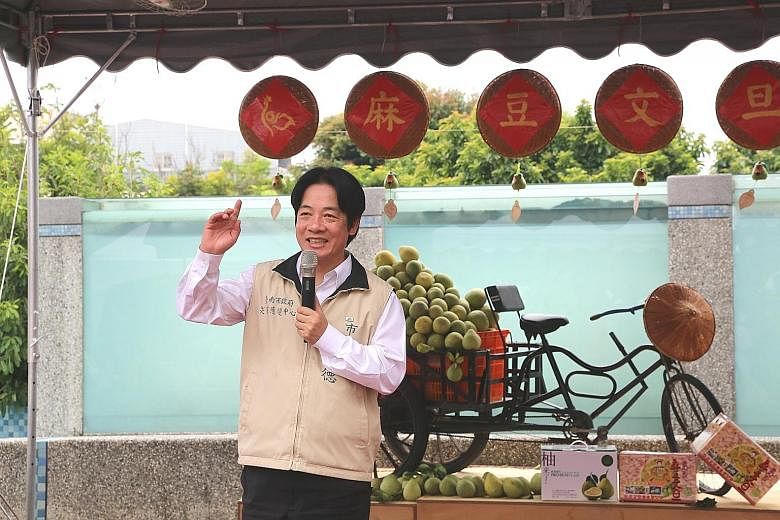He went from being a specialist in spinal cord damage to governing Tainan as its mayor, and now he is the premier of Taiwan.
Many of the island's 23 million people are looking to Mr William Lai Ching-te, who was sworn in last Friday, to diagnose what is ailing Taiwan and to come up with a cure.
Mr Lai has his work cut out for him. He has to revive a sputtering economy, soothe public anger over the government's labour and pension reforms, and allay Beijing's suspicions of his pro-independence inclination. Many observers see his appointment as helping to shore up President Tsai Ing-wen's sagging popularity and the ruling Democratic Progressive Party (DPP) ahead of local elections next year.
When Ms Tsai unveiled Mr Lai, 57, as the new premier last week, she said he was in tune with public opinion and the "most suitable person" to carry on the government's aim to accelerate the transformation of the economy and society.
Former presidential office adviser Wu Li-pei sees him as "able to motivate Taiwanese" to defend Taiwan while presidential adviser and pro-independence advocate Koo Kwang-ming, one of Mr Lai's most vocal supporters, has called him the "star of tomorrow", and urged him to run for president in 2020.
But Mr Lai has shown he will be fully focused on the task at hand, pledging in his first speech as premier that his new Cabinet will be "down-to-earth and pragmatic".
Mr Lai rose from humble beginnings in New Taipei, the son of a coal miner who died when he was two. He and his five older siblings survived on the money their mother earned from washing clothes.
Despite the family's hardship, he got into National Taiwan University, where he majored in rehabilitation medicine. He later earned a master's degree in public health from Harvard University.
After working in the National Cheng Kung University Hospital in Tainan for about 10 years, he switched from medicine to politics in 1996. He started as a campaign aide before winning a seat in the now-defunct National Assembly.
He ran in the 1998 Legislative Yuan election as a DPP candidate and won re-election three times. He won the mayoral race for Tainan, the DPP's southern stronghold, in 2010.
Mr Lai was consistently rated one of Taiwan's top political leaders in public opinion polls. He was also dubbed "No. 1 mayor" by local media for balancing the budget, putting in place effective flood control measures and establishing a city transportation network. He also promoted English, with the aim of making it the second official language in Tainan.
Still, there were a few bumps, such as in 2015, when he was criticised for not acting fast enough during a dengue epidemic.
His popularity earned him the moniker "Laishen", a combination of his surname and the Chinese word for god.
People who have worked with him say the high standards he set contributed to his success as mayor.
Taiwan's CommonWealth magazine cited an event organiser who recounted how Mr Lai rewrote a speech minutes before an event started because he found the prepared text less than ideal.
"He is a strict, meticulous, bold and charismatic leader. With such a boss, subordinates cannot just drift along," said the organiser.
Mr Lai is also known to be frugal.
Quoting a Tainan city government official, Taiwan's Business Today magazine said Mr Lai eschewed a lavish feast to celebrate his 2010 mayoral win in favour of pizza.
The magazine also said that when he went on overseas trips, the team comprised only five people and he carried his own luggage.
One thing that has not changed over the years is Mr Lai's distinctive centre-parted hairstyle and preference for wearing a suit and tie or a white long-sleeved shirt at all events, even in the sweltering heat.
CommonWealth magazine dubbed this the "Lai style", which also characterises his prudence and self-discipline.
Mr Lai also comes across as a private person who rarely talks about his wife of nearly 30 years, Madam Wu Mei-ru, and their two sons.
But he is very vocal about his support for Taiwan's independence, which some analysts say may rile Beijing, which sees Taiwan as a renegade province.
In the months before he was appointed premier, Mr Lai toned down his rhetoric, speaking about having an "affinity towards China, while loving Taiwan".
He back-pedalled, saying he still supports independence while wanting to be friendly and amicable towards China.
It should be remembered that it is the president who has the final say on cross-strait policy.
For now, Mr Lai shows himself eager to just roll up his sleeves and start taking the pulse of Taiwan.
In an interview with the Taipei Times in 2015, he said his medical training has helped him in his political career.
"The sickness could be said to be halfway cured when you find the right kind of doctor," he said.

